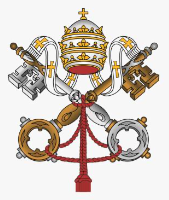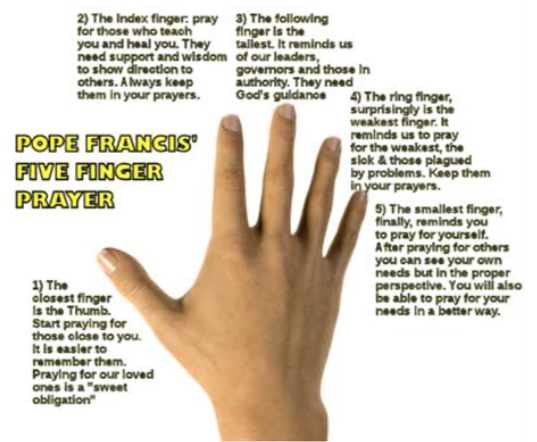A close look at this new 22 page document will be summer reading for all our Bishops. Early reading of it to help guide our Vision for St. Teresa’s is a must. These are some of the main points that catch the eye.
Pope Francis with pilgrims from the Italian dioceses of Bologna and Cesena-Sarsina in St. Peter's Square, April 21, 2018.
Denver Newsroom, Jul 20, 2020 / 01:20 pm MT (CNA.- The Congregation for Clergy on Monday published new guidelines for the world's parishes, which aim to encourage parishes to think of themselves as missionary communities of evangelisation.
The guidelines do not publish new norms or policies for parish life, but they do encourage Catholics to think prayerfully about what their parishes are, and what they’re for.
Here are a few themes and takeaways:
The parish is mission.
The guidelines offer parishes "a call to go out of themselves, offering instruments for reform, even structural, in a spirit of communion and collaboration, of encounter and closeness, of mercy and solicitude for the proclamation of the Gospel."
"Since its inception, the Parish is envisioned as a response to a precise pastoral need, namely that of bringing the Gospel to the People through the proclamation of the faith and the celebration of the Sacraments," the document says.
To meet its mission, "a renewed vitality is required that favours the rediscovery of the vocation of the baptised as a disciple of Jesus Christ and a missionary of the Gospel." Especially in parts of the world where many people do not know or practice the faith, the document encourages parishes to
discern how to think of themselves as missionary communities, and how to focus on proclaiming the Gospel to all who will hear.
The Eucharist and the poor should be central to parish life.
"The celebration of the Eucharistic mystery is 'the source and summit of the whole Christian life' and accordingly, the essential moment for building up the Parish community," the guidelines instruct.
The Mass should be the centre of parish life, the document says, and the place from which the parish receives its mission. In the Mass, the parish "welcomes the living presence of the Crucified and Risen Lord, receiving the announcement of the entire mystery of salvation.”
And, the document says, the poor should be invited to the heart of parish life.
"A 'sanctuary' open to all, the Parish, called to reach out to everyone, without exception, should remember that the poor and excluded must always have a privileged place in the heart of the Church," the document says.
"The Parish community evangelises and is evangelised by the poor, discovering anew the call to preach the Word in all settings, whilst recalling the 'supreme law' of charity, by which we shall all be judged."
Territoriality matters, but can't be a limit.
Most parishes are defined by territory. With few exceptions, a parish is, properly speaking, the communion of the baptised within the limits of a certain territory, which is defined by the bishop. In the West, that concept has mostly been forgotten, Catholics tend to go to Mass at the parish where they feel most welcomed or fed, and despite encouragement from some bishops, many Sunday Mass-goers don't know about parish boundaries.
The Congregation for Clergy's guidelines recognise that reality. “Increased mobility and the digital culture have expanded the confines of existence," the guidelines state, "people are less associated today with a definite and immutable geographical context, and digital culture has inevitably altered the concept of space, together with people's language and behaviour, especially in younger generations."
But the document insists that territoriality matters. That "interpersonal relationships risk being dissolved into a virtual world without any commitment or responsibility towards one's neighbour."
The parish is not a self-selected or self-defined community, but a set of people with obligations to each other, and the guidelines warn against losing that sense.
Because the parish is intended to encourage in neighbours a sense of Christian responsibility for one another, the document is clear that parishes building plans for evangelisation and missionary work must take into account "those who actually live within the territory. Every plan must be situated within the lived experience of a community and implanted in it without causing harm, with a necessary phase of prior consultation, and of progressive implementation and verification."
Still, the guidelines say, a parish's mission doesn't end at its territorial boundaries. In light of a changing world, "any pastoral action that is limited to the territory of the Parish is outdated."
In short, the guidelines urge Catholics to think of their parishes as a community, with obligations of neighbours to one another, who share a mission to proclaim the Gospel, together, beyond the limits of their own community.
Structures are for mission, but bureaucracy kills.
The guidelines emphasise that while the parish needs policies, programs, and structures to fulfil its mission, it must "avoid the risk of falling into an excessive and bureaucratic organisation of events and an offering of services that do not express the dynamic of evangelisation."
To overcome a tendency towards bureaucratisation and formalisation of the Church's sacramental and catechetical life "conversion of structures, which the Church must undertake, requires a significant change in mentality and an interior renewal, especially among those entrusted with the responsibility of pastoral leadership."
The guidelines also urge dioceses to consider developing new structures and roles that can coordinate activity between parishes, especially those in close geographic proximity to each other.
Responsibility for the parish mission belongs to everyone, but each has a role to play.
The document emphasises the co-responsibility of clergy, religious, and laity for the mission of the parish in the world. But the document also emphasises that each person work for the Kingdom in the role to which he is called by baptism and vocation.
The guidelines emphasise that the parish pastor is entrusted with the full "care of souls" in the parish, a role unique to priests.
The document acknowledges a canonical provision that allows lay people to be entrusted with pastoral care in a parish because of a shortage of priests, but emphasises that such a situation should be rare, and "a temporary and not a permanent measure," that can only be used when there is a true lack of priests.
"We are dealing here with an extraordinary form of entrusting pastoral care, due to the impossibility of appointing a Parish Priest or a Parish Administrator, which is not to be confused with the ordinary active cooperation of the lay faithful in assuming their responsibilities."
"Furthermore, it would be preferable to appoint one or more deacons over consecrated men and women or laypersons for directing this kind of pastoral care," the guidelines suggest.
The document takes care to urge against the "clericalisation of the laity" so frequently warned about by Pope Francis, in which laity are urged to take up roles more typically occupied by priests.
At the same, the document says that laity are called to give their lives to the mission of the Gospel and the work of the Church.
Laity are called "to make a generous commitment to the service of the mission of evangelisation, first of all through the general witness of their daily lives, lived in conformity with the Gospel, in whatever environment they are in and at every level of responsibility; in a particular way, they are called to place themselves at the service of the Parish community."
The guidelines also encourage a vision of deacons as ministers of service, rather than as assistants to parish priests, and of religious men and women as contributors to the evangelising mission of a parish through the witness of their religious consecration.
"Outgoing Dynamism."
The guidelines conclude with a call for "outgoing dynamism" that directs parishes toward an evangelising mission, the task of the entire People of God, that walks through history as the "family of God" and that, in the synergy of its diverse members, labours for the growth of the entire ecclesial body.
It urges that "the Parish might rediscover itself as a fundamental place of evangelical proclamation, of the celebration of the Eucharist, a place of fraternity and charity, from which Christian witness can shine for the world.”
Using the fingers on your hand, start with the thumb and pray these intentions in order:


 RSS Feed
RSS Feed